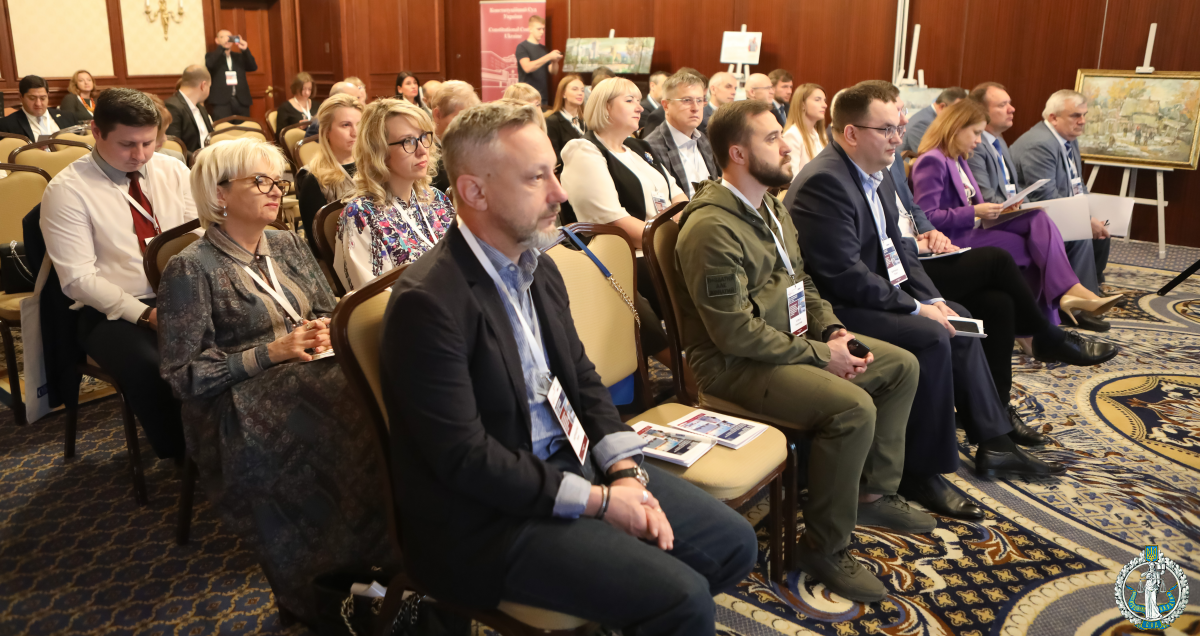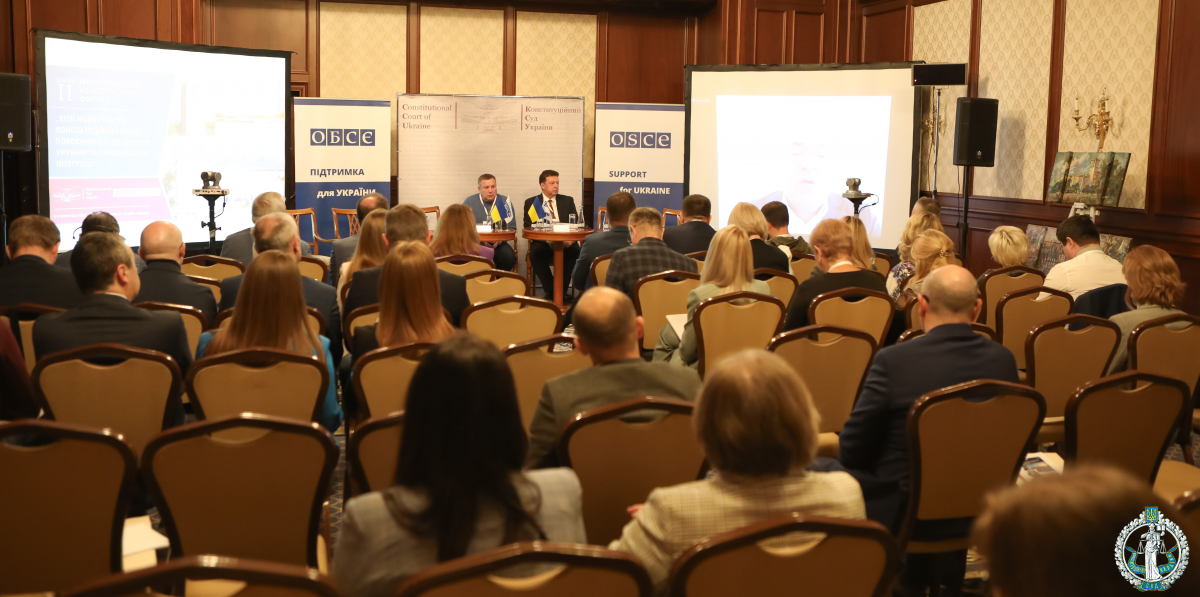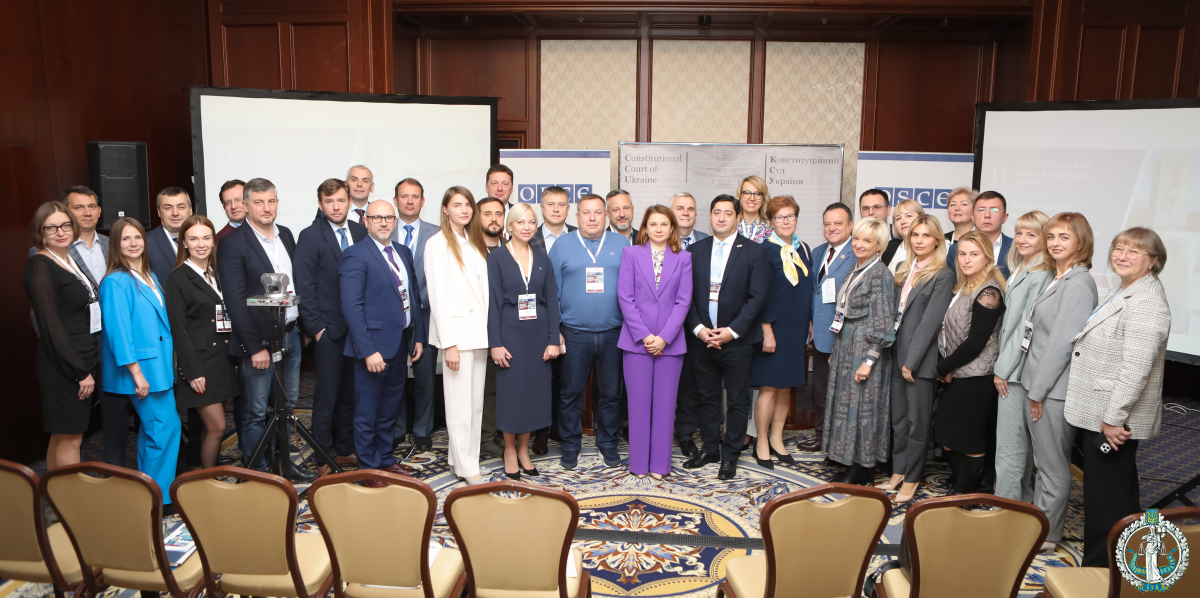October 6, 2023
On Friday, October 6, II Mariupol Constitutional Forum “Visions of the Future: Constitutional Dimension of Ukraine's PostWar Recovery and European Integration” took place. The event was organised in a mixed format by the Constitutional Court of Ukraine together with the OSCE Support Program for Ukraine.
The purpose of this event is to draw attention to the urgent issues of human rights protection using the tools of constitutional justice, restoration and affirmation of constitutional values and human rights throughout the territory of Ukraine.
The event brought together judges of the Constitutional Court of Ukraine, former judges of the Court, members of the Scientific Advisory Council of the Court, legal scholars, domestic and international experts in the field of constitutional law, representatives of state, judicial, scientific institutions, local self-government bodies, academic community , resettlement universities and public organizations, as well as representatives of constitutional jurisdiction bodies of foreign states and international organizations.
The participants of the forum observed a minute of silence in memory of the victims of the terrorist attack, which was carried out by Russia in the Kharkiv region yesterday, October 5, 2023.
Opening the forum, the judge of the Constitutional Court of Ukraine Viktor Gorodovenko on behalf of the Constitutional Court of Ukraine welcomed the participants of the II Mariupol Constitutional Forum and noted that for every Ukrainian, Mariupol is a city of labour glory, a city of metallurgists, sailors, students and extremely hardworking and friendly people who wholeheartedly love it.
Continuing his speech, the judge of the Constitutional Court of Ukraine pointed out that after the beginning of the unprovoked, unjustified, brutal aggression of the Russian Federation against Ukraine, Mariupol became a symbol of indomitability, a symbol of the spirit of Ukrainians, a symbol of the heroes-defenders of Azovstal - fighters of the legendary "Azov" regiment, marines, border guards, policemen and ordinary residents who, with weapons in their hands, began to defend their hometown.
The day of the beginning of full-scale aggression, February 24, 2022, changed Ukraine and Ukrainians forever, Viktor Gorodovenko noted. “We will no longer postpone solving problems related to national security. We will not accept the constitutional provision of Article 17 of the Basic Law of Ukraine as a purely declarative statement, according to which protecting the sovereignty and territorial integrity of Ukraine, ensuring its economic and information security, shall be the most important function of the State and a matter of concern for all the Ukrainian people,” the judge of the Constitutional Court of Ukraine is convinced.
The full-scale war, the speaker continued, which, in pursuance with the plan of strategists in the Kremlin offices, was supposed to destroy Ukraine as a state, actually hardened and united the entire Ukrainian people, turned us into a monolithic nation that bravely fights against the aggressor.
In addition, in his speech Viktor Gorodovenko drew attention to the role of the constitutional control body of Ukraine in the system of protection of democratic values and institutions, guaranteeing the constitutional human and citizen’s rights and freedoms, ensuring the effectiveness of the rule of law.
He emphasised that the Constitutional Court of Ukraine occupies an extremely important place institutionally among bodies of state power. “During the period of almost thirty years of activity, the Constitutional Court of Ukraine has repeatedly stood in the way of those who tried to destroy democratic values and did not respect the principle of the rule of law. Undoubtedly, the priority for the Constitutional Court of Ukraine is the establishment of the principle of the rule of law, protection of human and citizen’s rights and freedoms in the national legal system,” the judge stated.
At the same time, he added that the body of constitutional jurisdiction, even in this difficult time of war, continues to perform its functions and deliver decisions, affirming the democratic principles that we strive for on the way to the membership of our state in the EU.
Viktor Gorodovenko noted that Ukrainian society still faces many challenges ahead, but we Ukrainians have the support of the whole world, the entire international community.
Recalling I Mariupol Constitutional Forum, which was held on September 13-14, 2021, “Human dignity and ensuring human rights in the conditions of social transformations”, the speaker emphasised the importance of such events and noted that among the co-organizers and those who always support the Constitutional Court of Ukraine, there are all the leading scientists and scientific schools of our country and members of the Scientific Advisory Council of the Constitutional Court of Ukraine, the position of which is respected and the opinion of which is listened to.
Viktor Gorodovenko expressed his gratitude to the publishing house “Helvetyka” for the information support that contributed to the opportunity for a wide range of people from different parts of the world to join this event.
He also noted that the Mariupol City Council plays a special role in making Mariupol citizens feel confident today.
The speaker emphasised II Mariupol Constitutional Forum is dedicated to the vision of the future of the bold view of Ukrainians who have no doubt in the future victory, in the postwar recovery of Ukraine and its European integration.
He added that the program of the forum is structured in such a way that representatives of leading scientific and academic establishments, managers and representatives of state and communal institutions, our respected foreign experts and true friends of Ukraine, representatives of civil society, in an open friendly discussion, exchange opinions on the constitutional dimension of postwar reconstruction of Ukraine.
In this aspect, he emphasised the special role of the Organization for Security and Cooperation in Europe in this area. “The Constitutional Court of Ukraine and the OSCE have been cooperating fruitfully for a long time in a number of projects, and the holding of this forum is one of them. I thank the organization for its support and continued work on the development of constitutionalism and the strengthening of democratic institutions in Ukraine. I hope for further cooperation in improving constitutional justice both in the conditions of martial law and in the postwar period”.
Victor Gorodovenko concluded his speech with the words known to everyone: “I am Mariupol. Mariupol is Ukraine. Glory to Ukraine!”
The Special Representative of the OSCE Chairmanship - Project Coordinator in Ukraine, Ambassador Marcel Peško, welcomed the participants of the forum and noted the importance of the outlined issues that will be discussed, in particular, such as: access to justice, European integration, the gender dimension of postwar reconstruction, transnational justice and many others.
He recalled that the previous forum was held in peaceful Mariupol, and at that time, no one could predict that in a few months it would be destroyed and occupied by the aggressor and become “a city of terrible suffering of the civilians, a symbol of resistance and struggle for freedom”.
Marcel Peško noted that the barbaric aggression continues and many cities and villages of Ukraine are subjected to terrible attacks. “Today we pay respect and honour to the victims of the war and continue the dialogue with the people to create a clear vision of the postwar future of Ukraine, including the rule of law, human rights, democracy, gender equality, gender dimension, European integration”.
He assured that the OSCE would proceed with cooperation with the Constitutional Court of Ukraine, as well as with regional and local bodies and civil society. The joint project is aimed at supporting the people of Ukraine, the speaker said. In particular, the emphasis is on promoting access to constitutional justice, researching issues of gender equality and protecting human rights.
Marcel Peško wished all the participants fruitful work.
The first deputy mayor of Mariupol Mykhailo Kohut also addressed the participants of the event. He noted that the history of the city, like the history of the entire country, was divided into "before" and "after". "After" - when the aggressor state, without any reason, began to destroy not only our cities, but also everything that connects us with Ukraine. "They are destroying what they themselves do not have, our identity, the belief that we can live differently than they do”.
He emphasised that the most valuable thing for our state is people. With the beginning of the war, the city authorities, the speaker noted, organised 22 centers in 16 cities of our country, and today the people of Mariupol receive a variety of assistance - both legal and humanitarian.
Mykhailo Kohut is convinced that today's discussion will confirm our vision of the future in the European world. He stressed that the state of Ukraine is a European state, and despite all the difficulties, Ukraine will be in the European Union.
Concluding his speech, he thanked the entire Ukrainian people, the Armed Forces of Ukraine for their courage and endurance.
The work of the forum was organised in two plenary sessions and special sessions, the participants of which discussed the issues of postwar recovery of Ukraine and European integration.
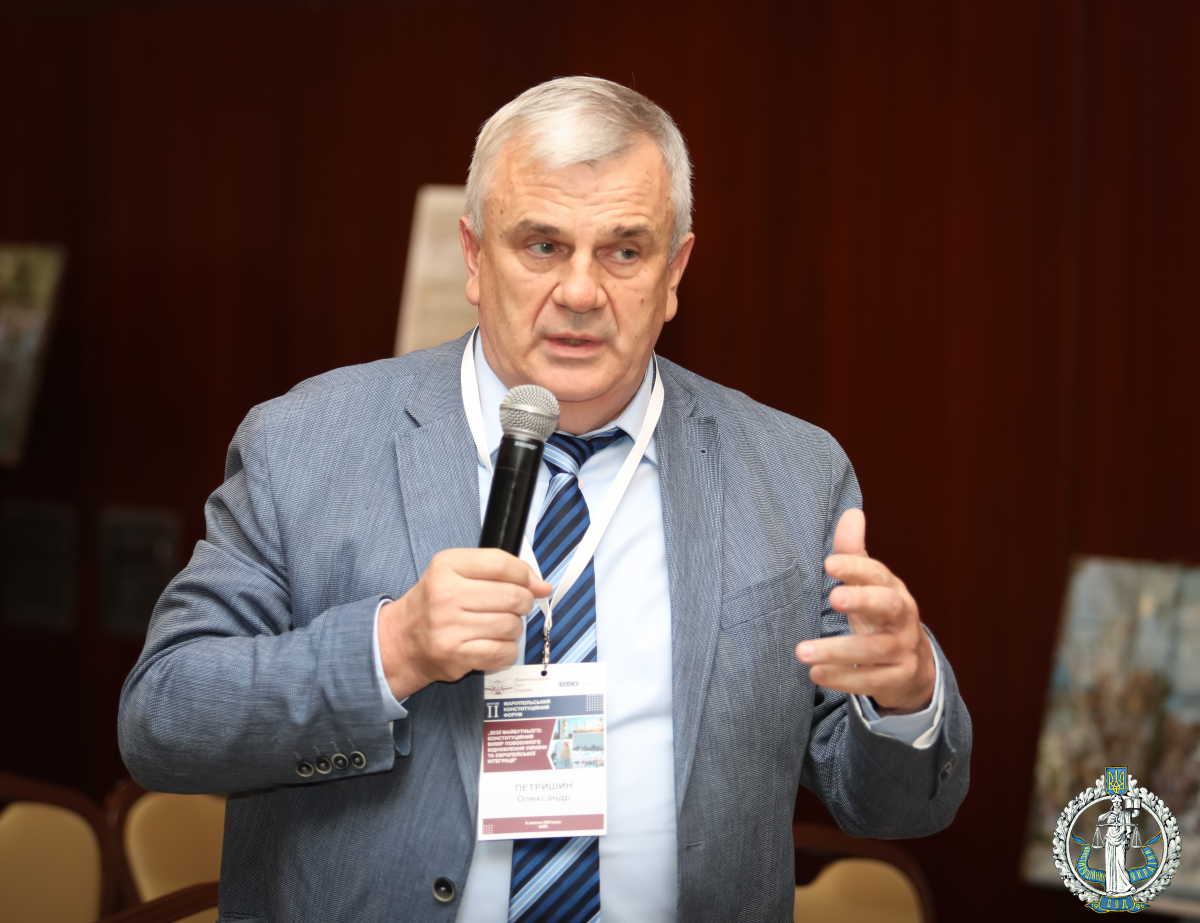 During the first session “Postwar recovery of Ukraine: constitutional and legal visions of the future”, the participants discussed what the legal system of Ukraine should be; constitutional justice in postwar conditions; overcoming social divisions: constitutional framework of institutions of transitional justice; strategies for overcoming the consequences of war; reintegration strategies of liberated territories. Judge of the Constitutional Court of Ukraine Oleksandr Petryshyn, who moderated this session, noted that today's discussion is topical and important, especially in the context of the future of our state, as well as the activities of the bodies of state power in Ukraine, civil society institutions.
During the first session “Postwar recovery of Ukraine: constitutional and legal visions of the future”, the participants discussed what the legal system of Ukraine should be; constitutional justice in postwar conditions; overcoming social divisions: constitutional framework of institutions of transitional justice; strategies for overcoming the consequences of war; reintegration strategies of liberated territories. Judge of the Constitutional Court of Ukraine Oleksandr Petryshyn, who moderated this session, noted that today's discussion is topical and important, especially in the context of the future of our state, as well as the activities of the bodies of state power in Ukraine, civil society institutions.
In his speech, the judge of the Constitutional Court of Ukraine, Oleh Pervomaiskyi, spoke about a number of issues currently facing the Constitutional Court of Ukraine in administering constitutional justice under martial law, and also outlined problems that may arise in the future.
The judge of the Constitutional Court of Ukraine pointed out the peculiarities of the functioning of the body of constitutional jurisdiction of our state, other bodies of state power, and institutions of civil society in the conditions of martial law. In particular, the judge emphasised that the Constitutional Court should be particularly responsible and careful when delivering decisions, because today such decisions may pose risks that will affect our future.
He also focused on issues that may arise after the end of the war. It is about the possibility of restrictions in the exercise of constitutional rights in relation to a certain category of persons, in particular collaborators and those who were involved in an armed attack by the aggressor country. According to the speaker, consideration of the issue of possible restrictions on the participation of these persons in the elections, their admission to the civil service, etc., is relevant at the moment and will emerge acutely after our victory.
Oleh Pervomaiskyi believes that such measures are extremely important, as they allow constitutionalists to discuss and develop several models for solving the most painful and urgent issues. In order not to question the long-term path on which Ukraine is already moving and will continue to do so, today judges, together with other representatives of the bodies of state power, scientists should join the discussion and work to regulate these and other questions in order to make as few mistakes as possible in the future, the judge of the Constitutional Court of Ukraine said.
The advisor to the mayor of Mariupol, Petro Andriushchenko, noted that the question of life after the war in the context of social conflict is currently being discussed in various circles, in particular, how Ukrainians who left the occupied territories and do everything it is possible for Ukraine to win this war, to live with de jure citizens who remained in the occupied cities and are currently helping the occupiers.
He also noted that the persons who participated in the organisation of the pseudo-referendum in 2014 in Mariupol were not punished, and now they are employees of the occupation authorities. Petro Andriushchenko is convinced that such persons should not influence the future of Ukraine after the war. Therefore, he noted, these issues require a fair legislative settlement even today.
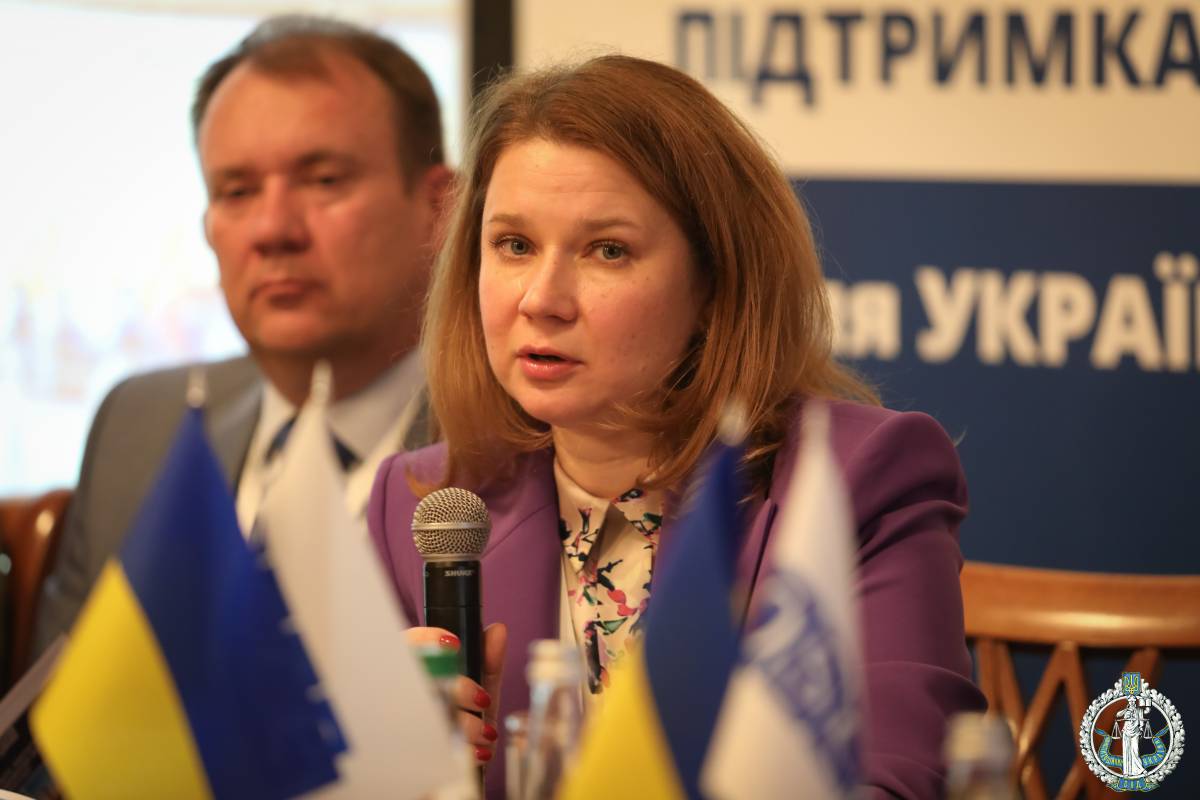 In her speech, Judge of the Constitutional Court of Ukraine Olha Sovhyria spoke in detail about the organisation features of the activities of the Constitutional Court of Ukraine, caused by the introduction of martial law in Ukraine, and cited specific legal positions of the Court, which to one degree or another relate to martial law.
In her speech, Judge of the Constitutional Court of Ukraine Olha Sovhyria spoke in detail about the organisation features of the activities of the Constitutional Court of Ukraine, caused by the introduction of martial law in Ukraine, and cited specific legal positions of the Court, which to one degree or another relate to martial law.
She stated that in the conditions of war, Russia attacks not only citizens and the territory of Ukraine, but also universally recognised democratic values. According to her, Ukraine courageously repels the enemy on the battlefield, and the activity of the public authorities in our country should be decisive as well.
In her report, Olha Sovhtria emphasised the fact that Russia's armed aggression against Ukraine started almost 10 years ago, on February 20, 2014, and already on February 24, 2022, it became full-scale. According to the judge, during this time both the Constitutional Court of Ukraine and other bodies of state power defend universally recognised democratic values, which are the essence of our state and, in fact, one of the ideas for which we are fighting in this war.
Olha Sovhyria also spoke about the peculiarities of the work of the Constitutional Court of Ukraine. Thus, the judge reported that over the last 1.5 years of full-scale war, the constitutional review body did not terminate its work and delivered 22 decisions. Of course, she noted, the war made certain adjustments to the activities of the Court and the optimal forms of work in view of the air alarms, rocket attacks, etc. were introduced.
In particular, the main form of the Court's work over the past 1.5 years has been written hearings. At the same time, on those issues that have a special public resonance, the Court holds oral hearings in order to hear the positions of experts in the relevant fields, representatives of bodies of state power, so that the decisions in these cases are as effective and well reasoned as possible.
At the same time, the judge said, the Constitutional Court during the war does not stop looking for ways to facilitate citizens' access to the protection of their constitutional rights, since such protection is, in fact, the purpose of its activity. She noted that over the past year, one of the successful steps in this direction is the introduction of a constitutional complaint form in the Court, which is freely available on the Court's official website and which can be used to file a constitutional complaint.
Olha Sovhyria noted that the Constitutional Court of Ukraine constantly takes into account the fact of the introduction of martial law in Ukraine, and in many decisions delivered after February 24, there is an indication of this. In her speech, she cited the Court's key positions on war and martial law formulated after February 24, 2022.
In particular, the judge noted that in the case of enhanced social protection of military personnel, the Constitutional Court of Ukraine takes into account the realities related to the armed aggression of the Russian Federation against Ukraine, the role of the Armed Forces of Ukraine and other military formations in the defense of the Ukrainian state, its sovereignty, independence and territorial integrity . Corresponding constitutional principles are the core of the constitutional system of Ukraine, thus its implementation in general, including human and citizen’s rights and freedoms guaranteed by the Constitution of Ukraine, depends on their protection.
In October 2022, the Court delivered a Decision on social guarantees for defenders of Ukraine, in which it noted that servicemen of the Armed Forces of Ukraine have a special legal status, special social guarantees should be granted to them, which should be commensurate with the contribution made by servicemen to the defense social order of Ukraine.
In the case regarding the full name of religious organizations, the Constitutional Court of Ukraine took into account not only probable (hypothetical) risks that could exist during the adoption of Law No. 2662-VIII, but also real consequences and threats from the activities of religious organizations (associations), the management center (administration) of which is located outside of Ukraine in a state that is recognised by law as having carried out military aggression against Ukraine and/or temporarily occupied part of its territory, in the conditions of large-scale armed aggression of the Russian Federation against Ukraine, encroachment on its sovereignty, territorial integrity and people's lives .
Finally, Olha Sovhyria drew attention to the issue of postponing the expiration of acts of the Constitutional Court of Ukraine. Currently, she noted, two trends have formed, namely the establishment of a certain fixed time, after which the contested law (its provision) becomes invalid, and the tying of such a moment to a certain period after the end of martial law. According to the judge, these trends require a thorough scientific understanding.
Yurii Barabash, vice-rector for scientific and pedagogical work and strategic development of Yaroslav Mudryi National Law University, Serhii Riznyk, vice-rector for scientific and pedagogical work and international cooperation of Ivan Franko National University of Lviv, and Oleksandr Kulha, advisor to the Commissioner for Persons Missing in War, expressed their opinions on these issues.
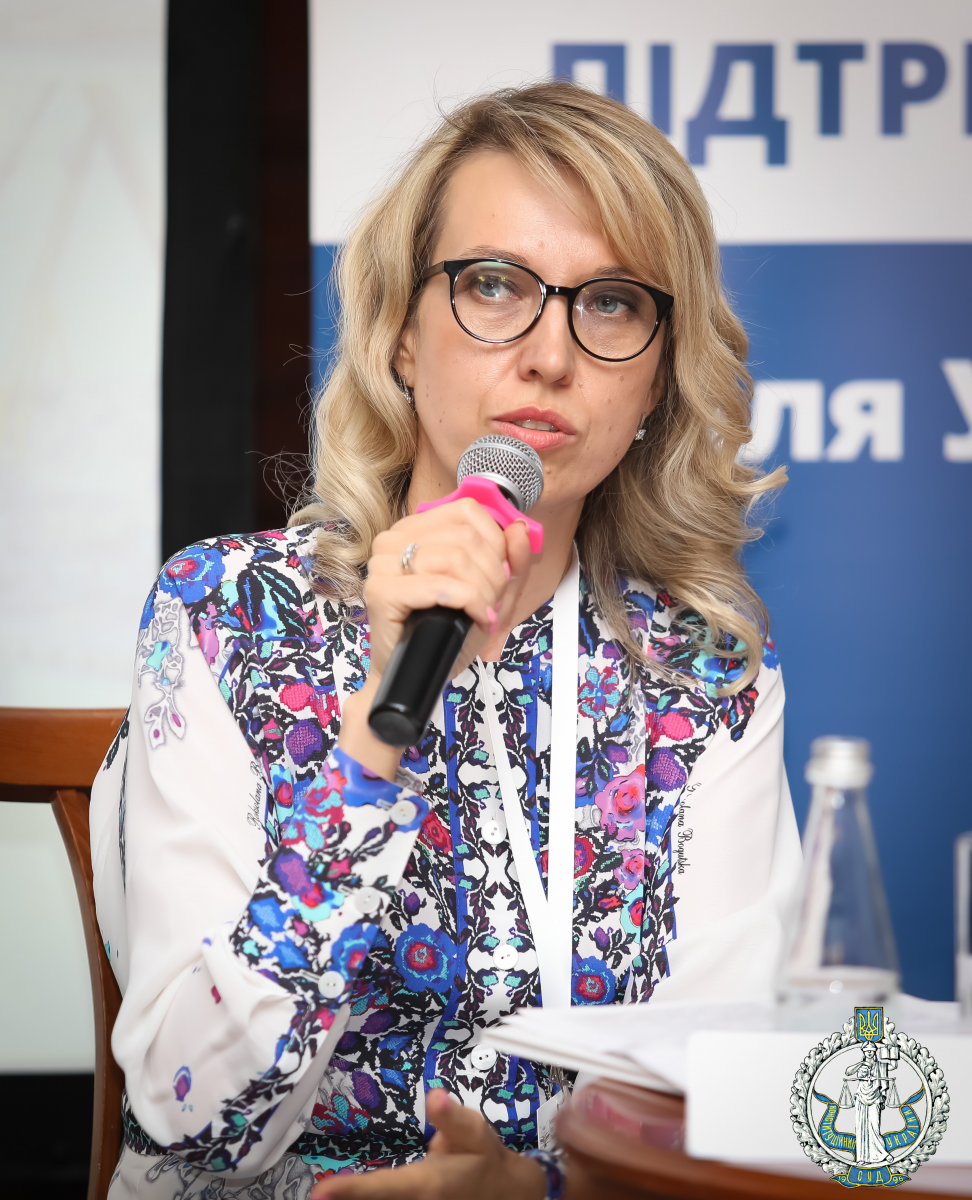 The next plenary session was devoted to the topic “Dignity, equality, freedom: horizons of the future”. Speakers focused on the following: the vision of a just society in the jurisprudence of the Constitutional Court of Ukraine; constitutional complaint as a tool for constructing a consensus vision of the future; human rights and power: the role of the state in a democratic society; gender and power: the concept of gender constitutionalism. Oksana Hryshchuk, the judge of the Constitutional Court of Ukraine, moderated this session.
The next plenary session was devoted to the topic “Dignity, equality, freedom: horizons of the future”. Speakers focused on the following: the vision of a just society in the jurisprudence of the Constitutional Court of Ukraine; constitutional complaint as a tool for constructing a consensus vision of the future; human rights and power: the role of the state in a democratic society; gender and power: the concept of gender constitutionalism. Oksana Hryshchuk, the judge of the Constitutional Court of Ukraine, moderated this session.
The judge of the Constitutional Court of Ukraine Viktor Gorodovenko delivered a presentation on the topic “Understanding legislative omission in the jurisprudence of the Constitutional Court of Ukraine: theoretical and comparative aspect”.
He analysed in detail the understanding of legislative omission in the jurisprudence of the Constitutional Court of Ukraine, the constitutional review bodies of foreign countries, as well as the European Court of Human Rights.
Viktor Gorodovenko emphasised that proper legislative regulation is the foundation of a state in which the rule of law operates, an important element of ensuring the protection and realisation of the fundamental human and citizen’s rights and freedoms, and, therefore, compliance with constitutional principles and the constitutional legal order as such. Instead, the judge pointed out, the absence, fragmentation, insufficiency of legislative regulation regarding a certain layer of social relations, under certain circumstances, causes a violation of the specified rights and freedoms, principles, and then these defects of legal regulation, which are legal omissions, must be corrected.
The speaker emphasised that legislative omission is an instrument that is actively employed in the practice of most bodies of constitutional jurisdiction. At the same time, the European Court of Human Rights also does not stand aside when a legislative lacuna is identified. As an example, Viktor Gorodovenko cited the judgment in the case of Vierentsov v. Ukraine dated April 11, 2013. Notably, the ECtHR found “violations of Articles 11 and 7 of the Convention caused by the legislative lacuna in the regulation of freedom of assembly that has existed in Ukrainian legislation for more than two decades. Given the systemic nature of the problem identified in this case, the legislation and administrative practice of Ukraine should be reformed urgently to bring them into line with the Court’s conclusions set out in this judgment and the requirements of Articles 7 and 11 of the Convention”.
The judge focused on the doctrine of legislative omission in the practice of the Constitutional Court of Ukraine, arguing that even though the Constitutional Court of Ukraine has only recently explicitly recognised the existence of legislative omission in its Decision No. 3-r/2022 dated December 23, 2022, the issue of unregulated legal relations that lead to violation of the Constitution of Ukraine is no longer something new for the Court. According to the speaker, from the very beginning of its functioning, the Constitutional Court of Ukraine has taken the position that inadequate legislative regulation or the absence thereof cannot be the basis for initiating constitutional proceedings in a case. At the same time, this position was gradually softened and now it can be found only in some cases, as a number of the Court's decisions actually investigated this issue, although it was not directly identified as a legislative lacuna.
In his presentation, the judge also analysed the issue of legislative omissions in the practice of foreign constitutional review bodies. He has pointed out that constitutional courts offer various ways to solve the problem of legislative omissions, in particular, they can: correct a legal provision containing gaps by interpreting the legal provision and subsequently filling in the lacunas; to declare a legal provision containing a lacuna unconstitutional, to direct the rulemaker to correct it; not to declare a legal provision containing a lacuna unconstitutional, but to express concern about it and advise the rulemaker on how to correct the problem, and to give a binding interpretation to the courts, which must take into account the interpretation of the Constitutional Court in deciding on relevant cases.
Viktor Gorodovenko noted that the Court’s practice of understanding legislative omissions and ways to eliminate them cannot be called unambiguous and established, but rather is at the initial stage of its development.
Following the judge’s words, in the Decision of the CCU No. 3-r/2022 dated December 23, 2022, the Court openly declared a legislative omission and stated that the existence of such an omission is a violation of the Constitution of Ukraine and it is not an ordinary legislative lacuna. In other words, the Court emphasised that a legislative omission is not an ordinary legislative lacuna, distinguishing it from a legislative omission.
Viktor Gorodovenko emphasised that the introduction of legislative omission as an instrument of national constitutional review and the first steps towards understanding such concept by the Court are in line with the trends of modern European constitutional doctrine and will undoubtedly contribute to strengthening the protection of constitutional values and the rule of law in Ukraine, in cases where the legislator does not provide for the adoption of the necessary laws, which creates shortcomings in legal regulation and violates constitutional norms.
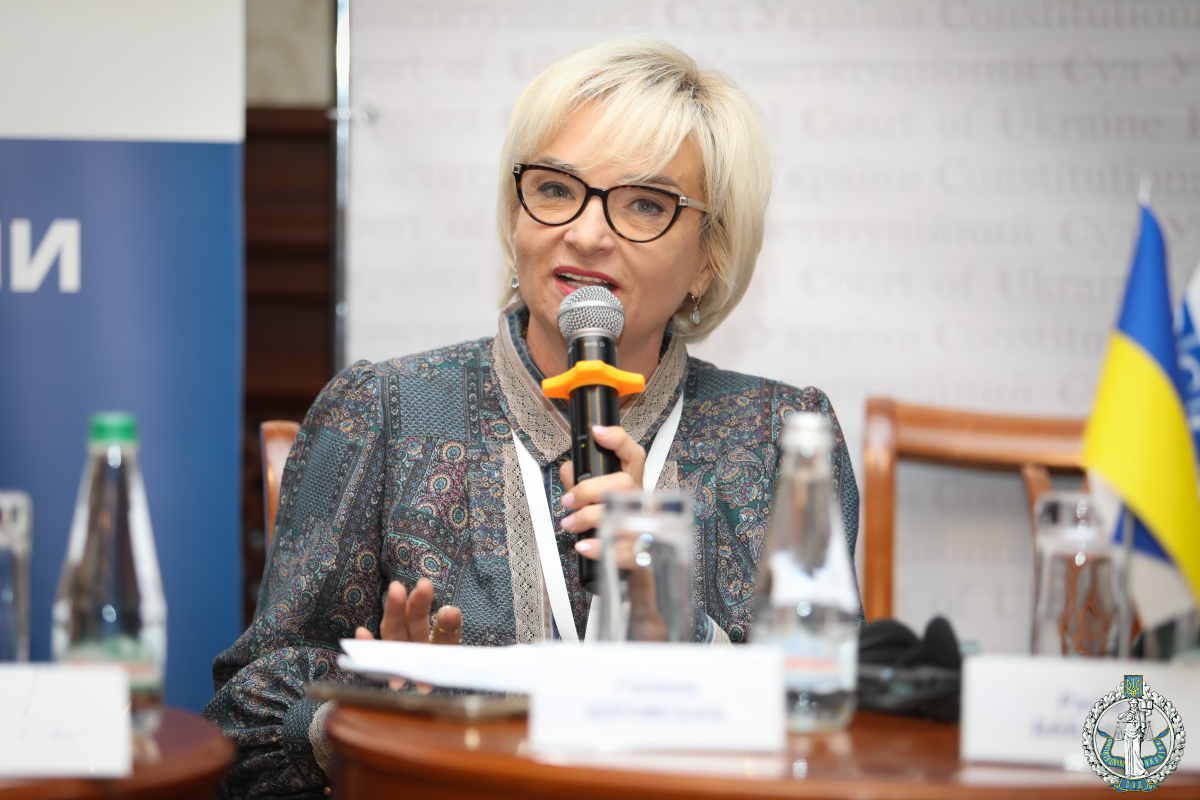 Galyna Yurovska, judge of the Constitutional Court of Ukraine, delivered a presentation “Gender and Power: the Concept of Gender Constitutionalism”
Galyna Yurovska, judge of the Constitutional Court of Ukraine, delivered a presentation “Gender and Power: the Concept of Gender Constitutionalism”
The judge focused on such concepts as “gender”, “gender constitutionalism”, which represents a type of constitutionalism, as well as its components, such as prohibition of discrimination, equality before the law, strengthening gender legal consciousness, protection of women’s rights, protection of the rights of diverse identities.
The speaker discussed certain decisions of the European Court of Human Rights, in which the Court expressed its approaches to gender-based treatment. In its judgments, the ECtHR found that the difference in treatment constituted discrimination, in particular in matters related to pensions for men and women; parental leave for male and female servicemen; inaccessibility of social assistance guaranteed to widows and widowers; and release of female offenders from life imprisonment.
As an example, the judge referred to the Judgment of the Constitutional Court of the Republic of Latvia (case 20202-34-03 dated April 8, 2021) on gender equality. The Constitutional Court of Latvia concluded that the existing system of family protection and support in the country... does not protect the families of same-sex couples legally, economically or socially, and therefore the impugned provision, to the extent that it applies to the testator’s surviving same-sex partner who lived with the testator as a family, is incompatible with the first sentence of Article 110 of the Constitution of the Republic of Latvia.
Kateryna Levchenko, Governmental Commissioner for Gender Policy, Tetiana Lomakina, Commissioner of the President of Ukraine on Barrier-Free Issues, and Serhii Shershun, State Commissioner of the Antimonopoly Committee of Ukraine, also took part in the discussion of the above-mentioned thematic issues.
During the event, three special sections were also held.
“Justice for All: Access to Justice in the Liberated Territories” was the topic of the first session moderated by Vitalii Hatseliuk, a member of the High Qualifications Commission of Judges of Ukraine.
The participants of this session discussed the reopening of courts in the liberated territories, the selection of judges, access to justice from the occupied territories, as well as the postwar judicial system and transitional justice instruments.
The second session included a discussion of issues related to European integration. In particular, the participants discussed amendments to the Constitution of Ukraine upon accession to the European Union, the institutional mechanism and parliamentary control, as well as the interaction between the Constitutional Court of Ukraine and the Court of Justice of the EU. Oleksandr Vodiannikov, Senior Project Officer of the OSCE Support to Ukraine Programme, moderated this session.
The gender dimension of postwar recovery was discussed during the third session. The topics of discussion were: Constitution and gender, gender analysis in constitutional proceedings; war and gender-based violence: guarantees of non-recurrence and gender equality as a basis for a just society. Olena Boryslavska, Professor of the Department of Constitutional Law at the Law Faculty of Ivan Franko National University of Lviv, moderated this session.
The event ended with the final session “The Future is Being Created Now”, moderated by Viktor Beschastnyi, Head of the Secretariat of the Constitutional Court of Ukraine. He expressed his gratitude to the partners of the Constitutional Court of Ukraine who made the event possible.
In conclusion, the participants outlined the results of the event and stressed the importance of a comprehensive approach to addressing relevant issues. The participants are convinced that such events are extremely important, as they allow constitutionalists to discuss and develop several models for addressing the most painful and urgent issues. All participants expressed confidence that the next forum will definitely take place in the city of Mariupol.
A collection of materials will be published based on the results of the II Mariupol Constitutional Forum.

Oleh Pervomaiskyi, Olha Sovhyria, judges of the Constitutional Court of Ukraine,
Petro Andriushchenko, Advisor to the Mayor of Mariupol,
Yuriy Barabash, vice-rector for scientific and pedagogical work and strategic development of Yaroslav Mudryi National Law University,
Serhii Riznyk, vice-rector for scientific and pedagogical work and international cooperation of Ivan Franko National University of Lviv,
Oleksandr Petryshyn, Judge of the Constitutional Court of Ukraine
(from left to right)
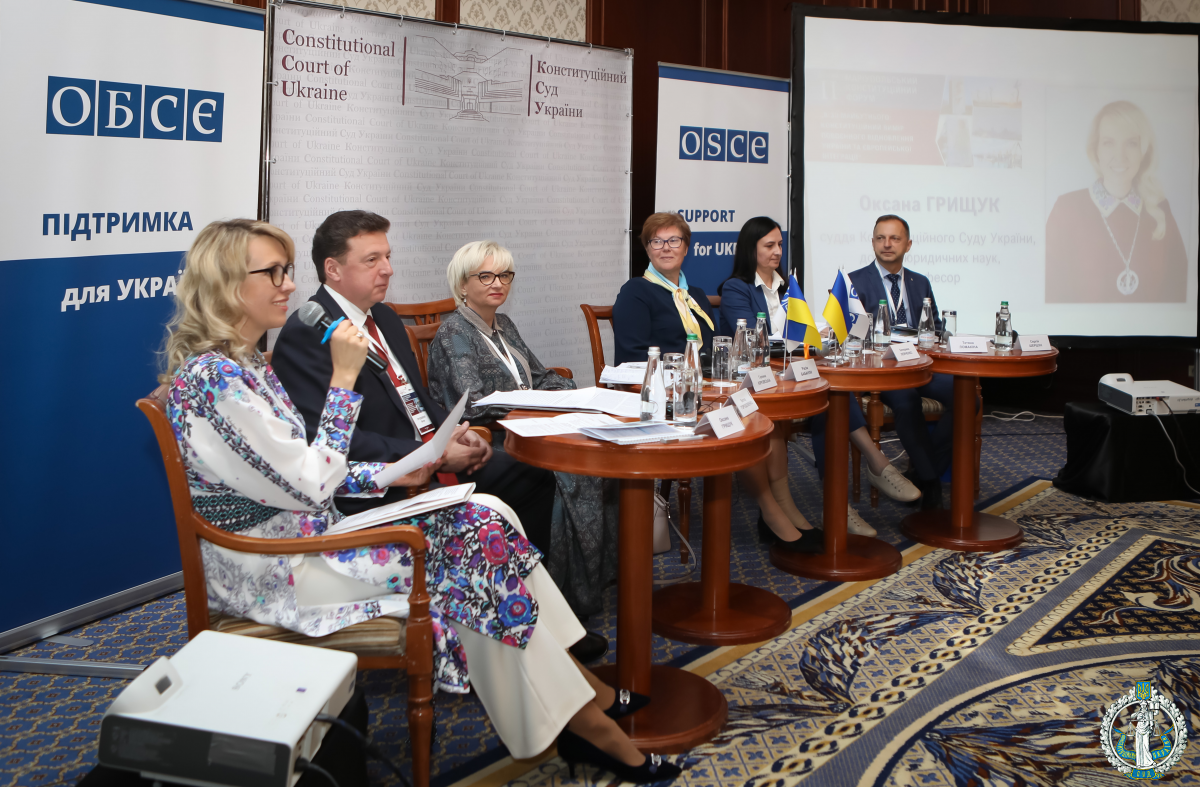
Kateryna Levchenko, Government Commissioner for Gender Policy,
Tetiana Lomakina, Commissioner of the President of Ukraine on Barrier-Free Issues,
Serhii Shershun, State Commissioner of the Antimonopoly Committee of Ukraine

